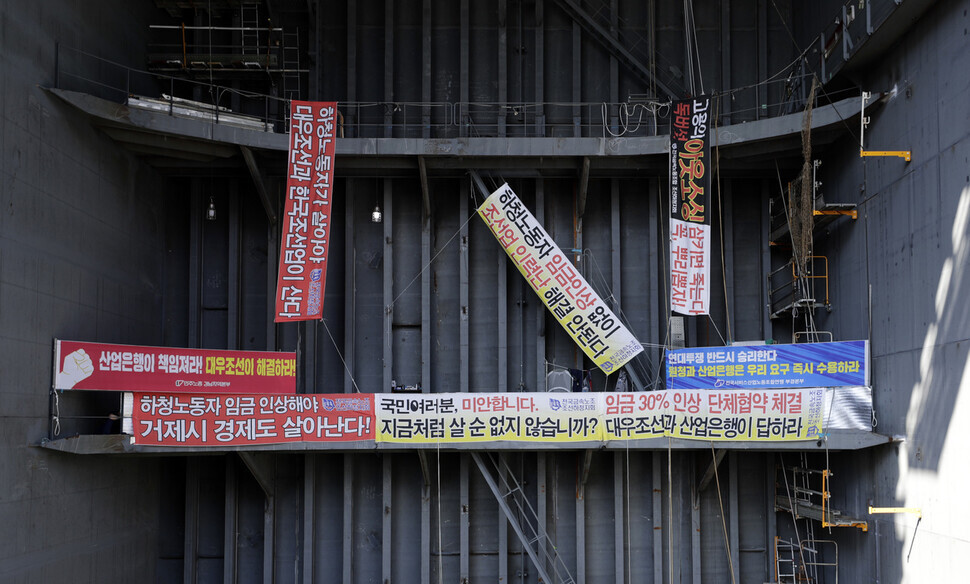hankyoreh
Links to other country sites 다른 나라 사이트 링크
[Editorial] Striking shipyard workers’ win must mark start of improvements to industry

Subcontract workers for Daewoo Shipbuilding & Marine Engineering (DSME) reached an agreement with management following negotiations on Friday, ending a 51-day strike.
Thanks to the agreement, Yu Choe-an was able to break free from the tiny metal cage, measuring one cubic meter in size, in which he’d locked himself in protest, and six other workers in a nearby sit-in were able to climb down after 30 days in their aerial perches.
It’s very fortunate that the strike concluded without any serious mishaps. In reality, the subcontract workers gained little from the negotiations compared to everything they’ve suffered.
But the strike did reveal the sacrifices that those workers have been forced to undergo because of the nature of the Korean shipbuilding industry. That’s a serious issue that Korean society will have to address going forward.
On Friday, the striking workers and management agreed to a 4.5 percent wage increase and three bonuses a year in a marathon round of negotiations that began in the morning. The two sides also agreed to organize a task force to improve wages for subcontracted workers.
Negotiations will continue about the thorny issue of whether workers who went on strike will face civil lawsuits and criminal charges for losses accrued in the strike. Considering how much effort was expended on reaching a deal, we hope management will show some magnanimity to avoid setting off another conflict.
A wage bump of 4.5 percent is far from the union’s initial key demand of raising wages by 30 percent to counteract a series of wage cuts since 2016.
At present, subcontracted workers at the shipyard are barely making more than minimum wage, and a huge gap separates them from the people directly employed by DSME.
Considering that subcontracted workers account for an overwhelming majority of the shipyard workforce, it’s no exaggeration to say that the Korean shipbuilding industry — which aims to be the best in the world — depends on those workers’ unilateral sacrifice.
Because of the poor wages and labor conditions subcontracted workers face in shipyards, even untrained workers are reluctant to take shipbuilding jobs.
Shipbuilding is one of the world’s most labor-intensive industries. Many subcontractors are in financial straits, falling behind on workers’ wages and insurance contributions. The money paid by the shipyard doesn’t even cover these companies’ actual expenses.
DSME needs to recognize that overeager cost-cutting could cause the entire industrial ecosystem to collapse.
DSME and the subcontractors’ insistence on civil litigation and criminal charges against the strikers, which delayed a deal in the negotiations, was largely guided by the repeated demands by the People Power Party, the government and President Yoon Suk-yeol himself for “stern action against illegal activities.”
Nevertheless, in a statement on the outcome of the negotiations, the government blustered that its “response to illegal actions that occurred during the illegal occupation will be based on law and principle.”
We urge the government to adopt the responsible position needed for it to serve as a fair mediator for labor and management and craft policies to normalize the shipbuilding industry.
Please direct questions or comments to [english@hani.co.kr]
Editorial・opinion
![[Editorial] Does Yoon think the Korean public is wrong? [Editorial] Does Yoon think the Korean public is wrong?](https://flexible.img.hani.co.kr/flexible/normal/500/300/imgdb/original/2024/0417/8517133419684774.jpg) [Editorial] Does Yoon think the Korean public is wrong?
[Editorial] Does Yoon think the Korean public is wrong?![[Editorial] As it bolsters its alliance with US, Japan must be accountable for past [Editorial] As it bolsters its alliance with US, Japan must be accountable for past](https://flexible.img.hani.co.kr/flexible/normal/500/300/imgdb/original/2024/0417/6817133413968321.jpg) [Editorial] As it bolsters its alliance with US, Japan must be accountable for past
[Editorial] As it bolsters its alliance with US, Japan must be accountable for past- [Guest essay] Amending the Constitution is Yoon’s key to leaving office in public’s good graces
- [Editorial] 10 years on, lessons of Sewol tragedy must never be forgotten
- [Column] A death blow to Korea’s prosecutor politics
- [Correspondent’s column] The US and the end of Japanese pacifism
- [Guest essay] How Korea turned its trainee doctors into monsters
- [Guest essay] As someone who helped forge Seoul-Moscow ties, their status today troubles me
- [Editorial] Koreans sent a loud and clear message to Yoon
- [Column] In Korea’s midterm elections, it’s time for accountability
Most viewed articles
- 1‘Right direction’: After judgment day from voters, Yoon shrugs off calls for change
- 2[Editorial] Does Yoon think the Korean public is wrong?
- 3[Editorial] As it bolsters its alliance with US, Japan must be accountable for past
- 4Where Sewol sank 10 years ago, a sea of tears as parents mourn lost children
- 5Japan officially says compensation of Korean forced laborers isn’t its responsibility
- 6[Guest essay] How Korea turned its trainee doctors into monsters
- 7Strong dollar isn’t all that’s pushing won exchange rate into to 1,400 range
- 8Umbrella with holes: New NK missiles prove Seoul’s defense system to be faulty at best
- 9Exchange rate, oil prices, inflation: Can Korea overcome an economic triple whammy?
- 10[News analysis] Watershed augmentation of US-Japan alliance to put Korea’s diplomacy to the test